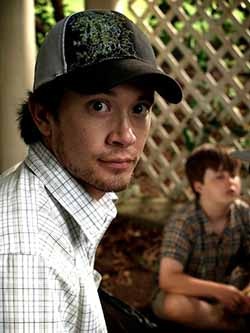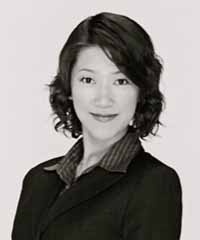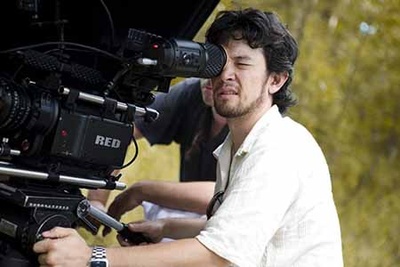B.C. filmmaker Brendan Uegama is intensely involved in the exploration of what-it-is-to-be Nikkei today.
Brendan, along with co-producer Shin-Ijusha Miho Yamamoto, is working on a short film called “Henry’s Glasses” which is based loosely on his family history, primarily grandfather, Imataro “Sam” Uegama who fought for Canada in World War One, his dad, Walter’s family internment experience at Greenwood, B.C. and Uegama’s artistic interpretation of these events.
Brendan, 29, discovered a love for photography while a skateboarding high school student in Tsawwassen, B.C. That passion for image making carried him into the filmmaking program at Capilano College in North Vancouver, B.C. He graduated in 2002. Since then has been a freelance film maker and cinematographer.
As a director, Uegama has recently been awarded a Kick Start Award by The Directors Guild of Canada for Henry’s Glasses, a 10-minute long narrative which takes place in the Tashme, B.C. internment camp in 1945. It’s about an eight-year-old Nikkei boy whose ‘magical’ glasses, a gift from his World War One vet grandfather, allow him to escape the harsh reality of growing up in an internment camp.
“I love stories about people using their imagination to escape to a different place. I've also really been interested in the power of the mind. We've all heard before that geniuses think in a more child-like manner than the rest of us. That lead me to believe that we are all born geniuses and throughout our lives we are mentally conditioned by limitations. As well, my ancestry has been a large part of my life these past couple years. My interest in culture has led me to explore my own in more detail. When I learned more about my father’s family’s internment experience I wanted to write about it to help the country and the world talk about it. These points inspired the creation of what became Henry's Glasses.”
It was while going through the research process, interviewing aunts and uncles, particularly Uncle Joe Shiho and dad, Walter, that his interest in the Canadian Nikkei story developed.
His grandparents, Imataro “Sam” and Kinoko Uegama (nee Kuroki, the inspiration for his company name: Black Tree Pictures) were both from Kanagawa-ken: his grandfather from Makurazaki and grandmother, Kawasaki City, respectively. Imataro was 17 when he arrived in Canada in around 1907. His was the familiar story of being the youngest brother who had limited prospects in Japan. He worked building railways, then for different hotels in B.C. and Alberta. His marriage to Kinoko was arranged before he left for Canada. She left a good job with a tobacco company and married Imataro returned in 1921. After serving in World War One, he started a dry cleaning business in Kitsilano. The family was interned at Greenwood during WW2 and afterwards, moved to Summerland where they had an orchard. Imataro passed away there. Kinoko passed away in 1992.
“Filmmaking is my medium of expression. It was only natural for me to make a film based on Japanese Canadian history. The second place the inspiration comes from is my love for films where the character uses their imagination, either voluntary or involuntary to take themselves out of a dark situation, into a new bright world. The inspiration behind it indulges me. Putting those together is what created Henry's Glasses.”
Learning family stories
When Uegama was in high school he didn’t learn anything about internment and his father never talked about it. “It wasn’t until I started asking questions that he started to open up. But he doesn’t remember much because he was eight or nine. My grandfather passed away before I was born and my grandmother had a stroke when I was about 5. It has only been in the past few years that he has become intensely interested in his Nikkei heritage.
Growing up Nikkei in Tsawwassen and Windsor, ON (1988-92) “meant nothing to me. I had no Nikkei friends, felt no discrimination and always lived in communities with very small Nikkei populations. I didn't even realize I was Japanese Canadian, although I did know my father is of Japanese descent (mother, Carol-Anne, is of Irish heritage).”
Brendan credits his father, Walter, as an important inspiration. “He’s a really good father. I just think about the history of my family which I didn’t appreciate until I was a little older. My father got fairly sick and that changed my relationship with him.” Walter was Vice-President of Continuing Education at the University of British Columbia before retiring.
“When I think of Canada, I think of a great multicultural country. I would hate to see Canada become completely blended and lose the individual cultures that make up this land. Perhaps my making of films based on my ancestral heritage is part of my way to help keep Canada from becoming blended. Being a Japanese Canadian is a great honour. The more active I am, the more I believe I am helping Canada become the great country it is and can be.”
Henry’s Glasses was cast on April 9th in Vancouver. Shooting begins in October and Uegama expects the film to be completed by April 2010. “The normal process is to get it out to festivals but we also want to get it into the education system too,” he adds.
Brendan and Miho are already planning an ambitious feature-length documentary about the Nikkei story which he envisions starting from the first Japanese settlers to Canada, through to the internment years and up to the Redress settlement. “Something that interests us is that when those first immigrants came over, they weren’t really able to do anything but be farmers and fishermen. The government controlled this for decades and decades. Nowadays, we have become very successful, helping Canada to become what Canada is today. We’re going to do a lot of interviews in B.C., Ontario and Manitoba and visit the internment sites. We want to tell the personal stories through the voices of the people.
“Why now? The age of those who were interned is critical. Within the next couple of decades there won’t be anyone left. Even the younger guys are now in their mid-seventies.” Time is running out.
*Norm always welcomes your comments at masaji777@gmail.com
** This article was originally published in Nikkei Voice (Toronto).
© 2009 Norm Ibuki








